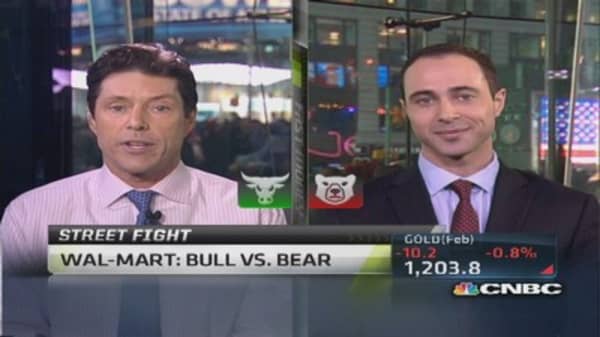Pumping through the output functions of most market strategists' Excel docs is 4 percent U.S. GDP growth in 2014 and an S&P 500 some 15 percent above current levels. The mood on the Street is that counter to 2013, PE multiple expansion will take a backseat to earnings growth re-acceleration as the kindling that ignites further share-price appreciation. All of this seems fairly logical to buy into given strong U.S. manufacturing reads to cap 2013, as well as enough nonfarm job creation to unleash the Fed taper beast from a cage to begin stalking stock and bond markets.
So with these pleasantries in mind, and U.S. non-financial companies sitting on well north of $1 trillion in liquid assets, why on Earth are we quietly witnessing a new, ugly round of corporate restructurings? Aren't companies supposed to restructure, or reorganize to keep it classy, only if they are: (1) presently unprofitable and don't know when profits would return to support existing infrastructure; and (2) there is a macro or industry-specific development at high probability of occurring in a 12-18 month time horizon that could cause a stock-price busting set of one-time charges to fixed assets held on the balance sheet?
First, consider the recent news flow:
- Macy's is shuttering five 100,000 square foot plus department stores, calling the maneuvers "proactive."
- Ruby Tuesday is closing 30 underperforming restaurants, having eliminated 70 positions in November and December alone.
- •Back in December, Coca-Cola stated its "streamlining reporting lines" as to gain "flexibility to adjust business."
- Sony's CEO continues to acknowledge "shrinking businesses" for his company's perpetual state of reorganization.
- In early December, before the holiday season was remotely near a conclusion, teen retailer Aeropostale unveiled an "accelerated store closure plan." Over the "next few years" the company will drop a peace out sign to 175 stores across the country, up from a 100 store estimate articulated to investors months earlier.
(Read more: Tracking the slow death of American icon Sears)
Second, consider these Twitter-friendly stats in trying to explain why companies should technically be investing in their future today:
- Alan Greenspan has stressed consistently, in his trademark fashion, that capex as a percentage of sales for U.S. companies remains low for this point in the economic cycle. The Maestro is right: The U.S. ranks 143rd in terms of fixed-asset investment as a percentage of GDP among major economies.
- There has been $13 trillion in wealth created in the last two years, the largest two-year gain since the 2003-2004 period. This wealth creation should be triggering excitement inside of board rooms as it represents potential opportunity.
- Millennials, an overused word that I am a group member of, are slated to spend $200 billion annually by 2017 through hopefully better jobs, but sadly more so due to inheritances.
So what is going on here? Why votes of no confidence by executives following a year of rising stock prices and economic recovery? Allow me to solve the mysteries …
(Read more: Customers paying the price after Target breach)
Execs want to play activist investor: Executives strive to stay atop the ship for as long as possible, especially nowadays as boards are diving deeper into the backgrounds of new replacements (job hopping becomes tougher) and leaning toward promotion from within to protect a culture. An executive realizes that in order to continue to be well-compensated at a public company, they must cut activists off at the pass by pre-emptively "unlocking value" by restructuring. If not, and the business continues to underperform, we learned in 2013 that an activist will arrive and take the message of a brighter future through detailed suggestions straight to beleaguered shareholders. In a U.S. economy that has a slow growth underbelly of 37.3 percent of the population characterized as long-term unemployed, reducing risk of operational malaise is as much a priority as searching for new growth areas.
Businesses are not performing up to the most level-headed of internal projections: Other than Macy's, all of the companies mentioned that have made restructuring announcements recently missed their operating plans outlined at the beginning of 2013. That means a shop, a restaurant, a manufacturing facility equate to excess capacity for the degree of demand that has settled in. Cut bone today, survive, then hand a leaner business to a successor 2-3 years forward.
Restructurings are a major bet on technological advancement: Macy's now has the capabilities to ship product directly from its stores to an online customer, so each store is a distribution facility. Coca-Cola is looking at a future of streaming discounts directly to the hands of consumers for its products in supermarket and convenience store aisles. Fast fashion is fast fashion because of new behind-the-scenes supply-chain technology, so Aeroposale has to shrink to be nimbler. As technology advances, from wearables to systems by SAP and Cisco, there is pressing need to reduce fixed capacity.
(Read more: Why Best Buy may be a bad buy: strategists)
The environment for American business, as I see it, is more about targeted fixed investment that could earn big-time paybacks in the future as opposed to large, broad-based spending that has unknown paybacks, which used to be the case.
— By Brian Sozzi
Brian Sozzi is CEO and chief equities strategist of Belus Capital Advisors. Follow him on Twitter @BrianSozzi.
Disclosure: Neither Brian Sozzi nor Belus Capital Advisors own shares of any of the stocks mentioned here. Belus currently has a "sell" recommendation for clients on Aeropostale.
(Read more: It's not as gloomy as you think for retail)




